Foundations
&
Basements
Foundation and Basement Services
Waterproofing
- Interior and Exterior waterproofing of your basements and foundations can help prevent warping, water damage, mold, and mildew build-up from damaging the walls and wooden structures in your home. These effects can occur from constant exposure to water, snow, rain, ice, etc.
Exterior Repairs
- Repairing cracks that can cause damage to the integrity of the structure of a building
Interior Repairs
- Repairing smaller cracks that may occur on the foundation or walls of basements. As well as Flooding, mold, mildew, warping, sagging flooring, etc.
Basement Window Infill
- These are needed during installation if there is a gap between the edge of a wall or roof and the brim of a window.
Foundation Types
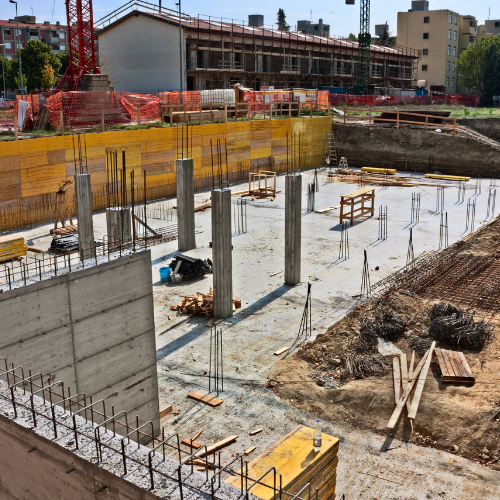
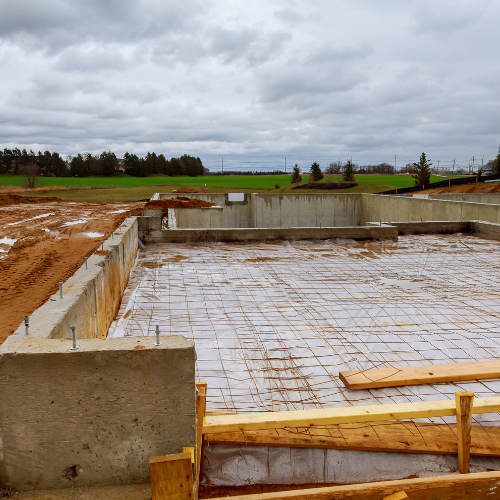
Raft Foundation
A raft or mat foundation is a large concrete slab that covers the entire footprint of a building. It distributes the building load over a large area, suitable for weak or expansive soil conditions. It is a large concrete slab that spreads the load from the structure over a wide area of soil, providing stability.
The construction process for a raft foundation typically involves excavating the site to the required depth, compacting the soil, and then pouring concrete to create the foundation slab. Reinforcement steel is often used within the concrete to provide additional strength and help prevent cracking.
Combined Footings
A combined or strip footing is a type of foundation used in construction to support multiple columns or loads within a relatively narrow area. It is designed to distribute the load from adjacent columns to the soil efficiently while minimizing differential settlement.
Combined footings are suitable for use in a variety of soil conditions, including cohesive soils, granular soils, and expansive soils. The design of the footing takes into account the bearing capacity and settlement characteristics of the underlying soil.
Deep Foundations
In construction, a deep foundation refers to a type of foundation that extends deep into the ground to transfer the structural loads of a building or structure to deeper, more stable soil or rock layers.
Basement Services
Basements are a common area seen in many homes and businesses. This area usually houses vital utilities that keep your home or business running.
Basement Services
Basements are a common area seen in many homes and businesses. This area usually houses vital utilities that keep your home or business running.
Exterior and Interior Basement Repairs
Repairs in this section of a home or business may seem trivial, however regular maintenance of this area is important. Some of the repairs that may need to be done to your basement may consist of cracks in your flooring or walls, water damage, mold and mildew removal, flood water removal, etc. As well as whatever repairs needed to be done to exterior foundations such as foundation cracks.
Basement Waterproofing
Waterproofing is an added layer of protection for your floors and walls. It can be done from the inside or the outside of your building or home. It can also help seal the concrete to help prevent flooding and leaks in the event of oversaturation in the soil below.
Basement Window Infill
If there is any damage between the top of the window and where it aligns with the wall, a window infill can be installed to repair the gaping that may be occurring. Window infills also provide your home protection from the elements. It can be installed as an added protection from rain, snow, etc.
Learn More
Basement Flooding
One of the main issues to occur in basements is flooding. At one time or another, a basement may flood. Flooding may occur due to a lack of proper water drainage during heavy rain or snowfall. When lots of rain or snow falls at faster rates the soil below may begin to shift and become too saturated causing leaks and flooding in your basements.
Caring For Flooding
After a basement has flooded, it is important to remove the water as soon as possible. Removing the water quickly can help reduce the amount of damage done to your floors and walls. If flood water is not attended to quickly, it can increase the amount of damage done to your basement as well as increase the risk of mold and mildew growing.
Foundation Services
Exterior and Interior Foundation Repair
Some cracks in foundations can be detrimental to the integrity and safety of a building. Repairing cracks in your foundation can help support and maintain the health and safety of your home or business. Foundation cracks can be found on the exterior wall as seen in the image on the right. They may also be seen on the concrete slab floors inside your basement.Foundation Water-Proofing
This is a barrier put on top of foundation walls as an extra layer of protection from moisture and water. This can be applied primarily through a water-proofing membrane that is applied to outer foundation walls.Learn More
Why Quality Materials Are Important
When building a good and strong foundation, the quality of the materials used is important. The better quality the materials are the more secure and durable the foundation will be.
Foundation Cracks
Not all foundation cracks are serious. Some cracks can be as simple as old or dry concrete. As seen in the image below.
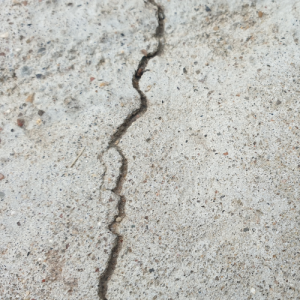
Building a Foundation
STEP 1
Properly preparing the site is essential. This involves clearing the area of any debris, vegetation, or obstructions. The site must also be properly graded to ensure water drainage away from the foundation. Excavation is then performed to reach the required depth and dimensions for the foundation.
STEP 2
Footings are the area that the foundation wall is built on. They distribute the weight of the structure evenly over the soil and prevent setting or shifting. Footings are typically made of concrete and are wider than the foundation walls they support. They are poured into trenches dug into the ground and reinforced with steel rebar for added strength.
STEP 3
Foundation walls provide structural support to distribute the weight of the building evenly to the footings. These walls can be constructed from various materials such as poured concrete, concrete blocks, or insulated concrete forms. The type of material used depends on factors such as soil conditions, building codes, and the specific requirements of the project.
STEP 4
Proper waterproofing and drainage are essential for protecting the foundation from water damage. This includes applying waterproofing membranes or coatings to the exterior of the foundation walls. Adequate drainage helps prevent water from pooling around the foundation, which can cause erosion, structural damage, and moisture problems inside the building.
Concrete Foundations
Brick Foundations
Brick foundations have been used for centuries and can offer strength, durability, and a traditional aesthetic to a structure. Brick foundations are built using a combination of bricks, mortar, and sometimes concrete footings or piers. The bricks are laid in a pattern typically using a running bond, with mortar applied between each course to create a solid, stable foundation wall. Depending on the structural requirements and building code, some brick foundations need to be reinforced with steel rebar or wire mesh.
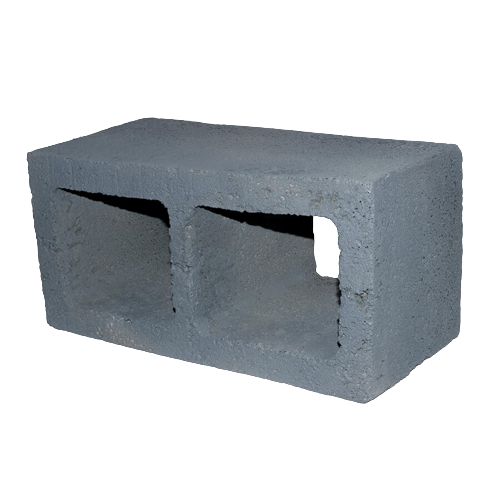

Block Foundation
vs.
Poured Concrete

Block Foundation
Pros
A concrete block foundation can usually bear more weight than a poured concrete foundation since concrete or cinder blocks are stacked like bricks.
The larger the building, the more likely you’ll need a stronger foundation to withstand the weight.
Concrete or cinder blocks are stacked, making them easy to transport to the site location.
Cons
Unlike poured concrete, concrete block foundations will have gaps and space between the layers and bricks since it’s not seamless.
To bond the concrete blocks, a mason will use mortar, but those gaps increase the risk of leaks.
Concrete block foundations take time since each piece has to be applied by hand.
Poured Concrete
Pros
Poured concrete is seamless and solid since it’s poured into a mold, reducing the likelihood of leaks.
It takes less time to pour concrete since it leverages machinery more than human labor to stack bricks.
Cons
Poured concrete requires specialized equipment and machinery such as bulldozers and cranes on-site to pour the concrete mix into the mold.
The wooden forms to create the mold are often large and heavy, which may require cranes to install.
Due to needing specialized machinery, poured concrete foundations typically cost more to build than concrete block foundations.
Why Choose the Washington State Masonry Company?
Expertise
We have a team of skilled professionals with extensive experience in masonry work, including foundation and basement repair. They would know how to assess the problem, determine the best course of action, and execute repairs effectively.
Quality Workmanship
Masonry work requires precision and attention to detail. A reputable company prioritizes quality craftsmanship to ensure that repairs are done correctly the first time, providing long-lasting solutions for your foundation or basement issues.
Specialized Equipment and Techniques
The Washington State Masonry Company has access to specialized equipment and techniques specifically designed for foundation and basement repair. This enables them to tackle even complex problems efficiently and effectively.
Local Experience
The Washington State Masonry Company, A company based in Washington State hasa deep understanding of the local soil conditions, climate, and building codes. This local knowledge can be invaluable when addressing foundation and basement issues, ensuring that repairs are tailored to the specific needs of the area.
Licensed and Insured
The Washington State Masonry Company are licensed and insured professionals. This provides you with peace of mind knowing that the work is being carried out by qualified individuals and that you’re protected in case of any unforeseen incidents.
Customer Satisfaction
We prioritize customer satisfaction, aiming to provide excellent service from start to finish.
FAQs
Q: Why is a solid foundation important for a building?
A: A solid foundation is critical because it provides structural support and stability to the entire building. It prevents settling, sinking, and structural damage, ensuring the safety and longevity of the structure.
Q: How do I know if my foundation needs repair?
A: Signs of foundation issues include cracks in walls or floors, uneven or sloping floors, sticking doors or windows, and moisture problems in the basement. Our experts can assess and recommend the appropriate solution.
Q: Do you offer warranties for your basement construction work?
A: Yes, we stand behind the quality of our work. We provide warranties to ensure your peace of mind, and the specific terms may vary depending on the project.
Shop Brick Options
Fireplaces
Materials
Chimneys

Walls
Cleaning
Latest Articles

How Often Does a Gas Fireplace Chimney Need to Be Cleaned?
A gas fireplace chimney needs to be cleaned at least once a year. Annual cleaning prevents carbon monoxide leaks, ensures proper ventilation, improves efficiency, and identifies potential issues like blockages or corrosion,...

How Much Does It Cost to Finish a Basement Project?
Finishing a basement project typically costs between $7,000 and $23,000, depending on size, materials, and labor. High-end projects can exceed $35,000. How Much Does It Cost to Finish a Basement? The cost of finishing a basement...
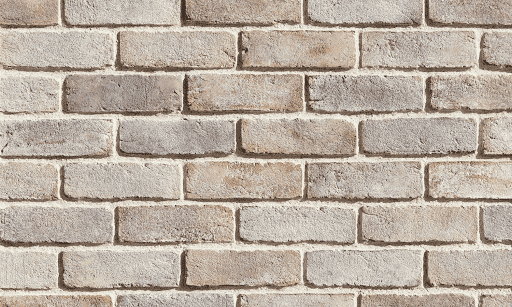
Which Brick is Right for Your Project?
Bricks are one of the oldest and most versatile building materials, used in construction for centuries. They come in various types, each with its unique properties and uses. Whether you're building a new home, renovating, or working on a landscape project, choosing...

The Washington State
Masonry Company
License No. BRICKBD809Q4
Same day or same week estimates and completions
5 year warranty on all workmanship
Based out of Federal Way, WA
Call Us At: 206-437-6582



